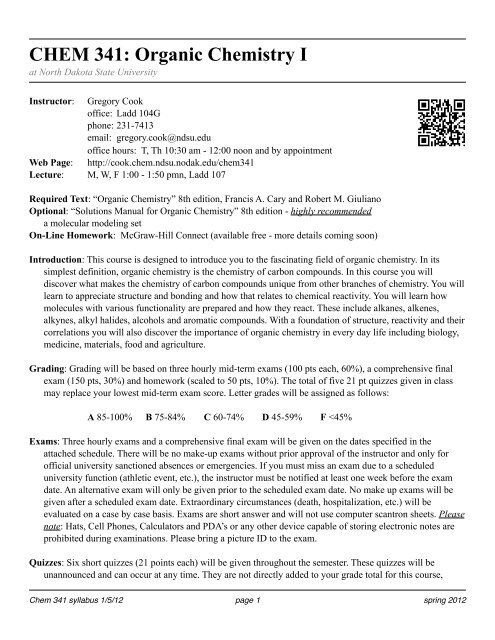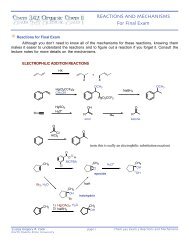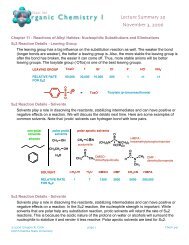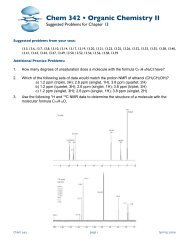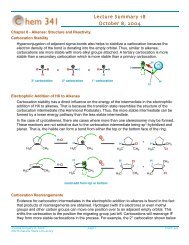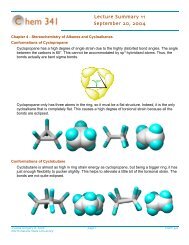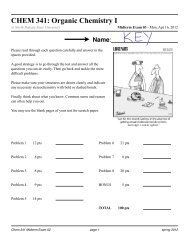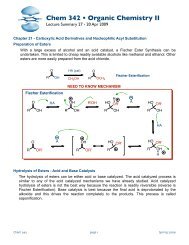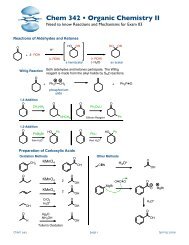CHEM 341: Organic Chemistry I - Cook Group
CHEM 341: Organic Chemistry I - Cook Group
CHEM 341: Organic Chemistry I - Cook Group
Create successful ePaper yourself
Turn your PDF publications into a flip-book with our unique Google optimized e-Paper software.
<strong>CHEM</strong> <strong>341</strong>: <strong>Organic</strong> <strong>Chemistry</strong> I<br />
at North Dakota State University<br />
Instructor: Gregory <strong>Cook</strong><br />
office: Ladd 104G<br />
phone: 231-7413<br />
email: gregory.cook@ndsu.edu<br />
office hours: T, Th 10:30 am - 12:00 noon and by appointment<br />
Web Page: http://cook.chem.ndsu.nodak.edu/chem<strong>341</strong><br />
Lecture: M, W, F 1:00 - 1:50 pmn, Ladd 107<br />
Required Text: “<strong>Organic</strong> <strong>Chemistry</strong>” 8th edition, Francis A. Cary and Robert M. Giuliano<br />
Optional: “Solutions Manual for <strong>Organic</strong> <strong>Chemistry</strong>” 8th edition - highly recommended<br />
a molecular modeling set<br />
On-Line Homework: McGraw-Hill Connect (available free - more details coming soon)<br />
Introduction: This course is designed to introduce you to the fascinating field of organic chemistry. In its<br />
simplest definition, organic chemistry is the chemistry of carbon compounds. In this course you will<br />
discover what makes the chemistry of carbon compounds unique from other branches of chemistry. You will<br />
learn to appreciate structure and bonding and how that relates to chemical reactivity. You will learn how<br />
molecules with various functionality are prepared and how they react. These include alkanes, alkenes,<br />
alkynes, alkyl halides, alcohols and aromatic compounds. With a foundation of structure, reactivity and their<br />
correlations you will also discover the importance of organic chemistry in every day life including biology,<br />
medicine, materials, food and agriculture.<br />
Grading: Grading will be based on three hourly mid-term exams (100 pts each, 60%), a comprehensive final<br />
exam (150 pts, 30%) and homework (scaled to 50 pts, 10%). The total of five 21 pt quizzes given in class<br />
may replace your lowest mid-term exam score. Letter grades will be assigned as follows:<br />
A 85-100% B 75-84% C 60-74% D 45-59% F
however, they can be beneficial. Quizzes can only help your grade, not hurt it. The best 5 quizzes out of the<br />
6 will be totaled. This total will replace your lowest mid-term exam score if it is higher. Under no<br />
circumstances will there be any makeup quizzes. It is in your best interest to attend class and take all<br />
quizzes. Even if the points will not help your grade, it is a good exercise to practice organic problems. Quiz<br />
answers will be posted on the class web page. All quizzes will be multiple choice and computer scored. You<br />
may keep the quizzes, but scantron answer sheets are not returned.<br />
Homework: This course will use the on-line homework system from McGraw-Hill called connect /<br />
LearnSmart. Homework will be assigned for each chapter. The total points earned doing homework will be<br />
factored as 10% of your semester grade. More information about the homework will be provided as we get<br />
the on-line system set up.<br />
Learning Tips: <strong>Organic</strong> chemistry is not hard, but it does take a lot of hard independent work. The most<br />
important thing you can do to be successful in this class is to attend every class, stay current and keep up.<br />
Unfortunately, <strong>Organic</strong> <strong>Chemistry</strong> is a broad field with lots of new concepts for you to learn. The material<br />
comes very fast and there’s really not much I can do other than try to explain the material in a simple and<br />
understandable fashion. It just isn’t possible to cram for organic chemistry on the night before an exam.<br />
Believe me when I tell you that studying an hour or two everyday will be much better than studying for 12<br />
hours on a weekend. It is not easy to absorb all the material in one sitting, and a daily dose will make<br />
comprehension much easier. It will take effort on your part to learn organic chemistry.<br />
Learning organic chemistry is very much like learning a foreign language. You need to learn the vocabulary<br />
in terms of names, structures, and types of functional groups. You also need to learn the rules of grammar.<br />
For example, how an alcohol will react with a halide, etc. Once you learn certain rules, they can be applied<br />
to many different reactions. Thus you can construct chemical sentences. There will be a certain amount of<br />
memorization required, however, because of the vastness of the subject, learning general trends and rules<br />
will be most helpful. Here are some suggestions to help you be successful:<br />
Read the chapter ahead before coming to class<br />
Ask questions<br />
Rewrite your notes after every class<br />
Do problems as many times as necessary to understand the material<br />
Use the study guide but try to answer problems before looking up the answers first<br />
Use flash cards to help learn structures, names and reactions<br />
Find a friend or form a study group<br />
Buy a set of molecular models<br />
Utilize instructor, SI and TA office hours<br />
Special Needs: All students have the right to an environment that is conducive for learning. Any students who need special<br />
accommodations for learning or who have special needs are invited to share these concerns or requests with the instructor as soon<br />
as possible.<br />
Academic Responsibility: It is assumed that students at NDSU have the integrity to complete examinations on their own. I will<br />
provide an examination environment that discourages temptation otherwise. Any student who is found to have acted dishonestly<br />
on an exam will receive an F for that exam or depending on the circumstances, an F for the course. A second infraction will result<br />
in an automatic F for the course. Please note that a single infraction of academic responsibility could be grounds for expulsion<br />
from the university. The policy applied is that of the Code of Academic Responsibility and Conduct as outlined in NDSU<br />
University Senate Policy, Section 335: Code of Academic Responsibility and Conduct (http://www.ndsu.edu/academichonesty)<br />
Chem <strong>341</strong> syllabus 1/5/12! page 2! spring 2012
Course Outline<br />
Tentative Class Schedule<br />
(subject to change)<br />
Chapter 1 Structure Determines Properties Jan 11, 14, 18, 20<br />
Chapter 2 Alkanes and Cycloalkanes: Introduction to Hydrocarbons Jan 23, 25, 27, 30<br />
Chapter 3<br />
Alkanes and Cycloalkanes: Conformations and cis-trans<br />
Stereoisomers<br />
Feb 1, 3, 6, 8<br />
Exam 1 Friday, Feb 10 - Chapters 1-3<br />
Chapter 4 Alcohols and Alkyl Halides Feb 13, 15, 17<br />
Chapter 5 Structure and Preparation of Alkenes: Elimination Reactions Feb 22, 24, 27, 29<br />
Chapter 6 Addition Reactions of Alkenes Mar 2, 5, 7<br />
Exam 2 Friday, Mar 9 - Chapters 4-6<br />
Chapter 7 Stereochemistry Mar 19, 21, 23, 26<br />
Chapter 8 Nucleophilic Substitution Mar 28, 30, Apr 2, 4<br />
Chapter 9 Alkynes Apr 11, 13<br />
Exam 3 Monday, April 16<br />
Chapter 10 Conjugation in Alkadienes and Allylic Systems Apr 18, 20<br />
Chapter 11 Arenes and Aromaticity Apr 23, 25, 27<br />
Chapter 12<br />
Reactions of Arenes: Electrophilic and Nucleophilic Aromatic<br />
Substitution<br />
Apr 30, May 2, 4<br />
Final Exam Thursday, May 10 - 10:30 am - 12:30 pm - 50% chapters 1-9,<br />
50% chapters 10-12<br />
Holidays: Jan 16 - Martin Luther King Jr. Day Exam Dates: Fri, Feb 10<br />
Feb 20 - President’s Day Fri, Mar 9<br />
Mar 12-16 - Spring Break Mon, Apr 16<br />
Apr 6, 9 - Spring Holiday<br />
Thu, May 10 final exam<br />
Chem <strong>341</strong> syllabus 1/5/12! page 3! spring 2012


